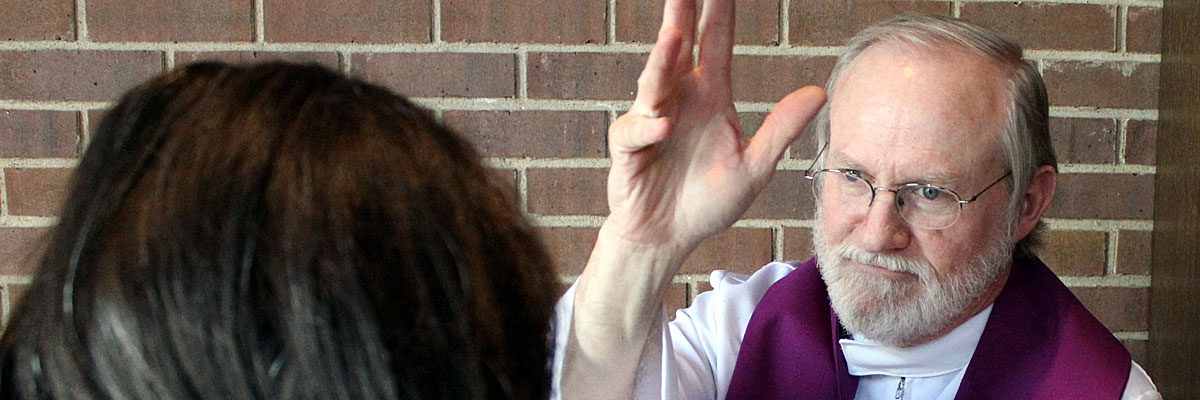Official Website of the
Catholic Diocese of Little Rock
Reconcile With God Through Confession
Click on the button above to find reconciliation times statewide. A similar schedule is also available in Spanish. Most parishes offer regular confession times at least once a week, but priests are willing to make appointments as needed. Or you can go to confession any day but Monday at the Divine Mercy Shrine located in St. Edward Church in Little Rock. No appointment needed. See the reconciliation schedule.
"Let us not grow tired of asking for forgiveness in the sacrament of penance and reconciliation, knowing that God never tires of forgiving. Let us not grow tired of fighting against concupiscence, that weakness which induces to selfishness and all evil, and finds in the course of history a variety of ways to lure men and women into sin. One of these is addiction to the digital media, which impoverishes human relationships. Lent is a propitious time to resist these temptations and to cultivate instead a more integral form of human communication made up of 'authentic encounters', face-to-face and in person." — Pope Francis, Lenten Message, 2022
Updated March 7, 2024
"Even now, says the Lord, return to me with your whole heart." (Joel 2:12). This Scripture begins the first reading on Ash Wednesday, and sets the tone for the entire season of Lent. To reconcile with God is the reason for the sacrament of reconciliation. According to the Rite of Penance, "It is therefore fitting to have several penitential celebrations during Lent, so that all the faithful may have an opportunity to be reconciled with God and their neighbor and so be able to celebrate the paschal mystery in the Easter Triduum with renewed hearts" (No. 13).
Father Norbert Rappold said Lent has always taken on a penitential theme. "Originally it was tied very much into RCIA (now Order of Christian Initiation of Adults)," he said. "It was a time in which they really examined their lives and began to really seriously turn away from their sinful ways and embrace Scripture, embrace the Gospel, embrace this new way of life."
As the Church evolved and people were growing up in the faith and there was less of a need for adult conversion, "this season of Lent was found to be more beneficial still as a season to stop and seriously reflect on 'where am I in my life? Am I turning away from sin? And am I turning toward God?'" he said. "Confession just very naturally fits into the season of Lent and the penitential season that it was always meant to be."
Msgr. David LeSieur said the connection of confession with Lent is related to baptism. "We are either preparing during Lent to recommit ourselves to our baptismal promises at the Easter Vigil, or we are preparing to be baptized," he said. "Lent is a season of reflection on and repentance for sin. Reconciliation, like Lent, is tied into our fidelity to the meaning of baptism in Christ — dying and rising with him."
This excerpt was taken from "Reconciliation and Lent," Arkansas Catholic, Feb. 17, 2007.
What is Reconciliation?
Read this step-by-step guide on how to make a good confession.
We receive God's healing forgiveness for sins committed after baptism during reconciliation. It is called reconciliation because it reconciles us not only with God but with the Church community. ("Handbook for Today's Catholic," 56)
According to "The Catholic Source Book," the four parts are: 1. Contrition — internal sorrow, repentance; 2. Confession — telling of sins for which absolution is requested; 3. Absolution — healing power of Jesus (forgiveness); and 4. Satisfaction — penance, reform of life.
The Catechism of the Catholic Church explains that the two essential elements are the human part (through the action of the Holy Spirit; nos. 1, 2, and 4) and God's action (through the intervention of the Church; no. 3)
Obligation for minister of reconciliation (priest) to maintain secrecy; sometimes called the seal of confession (catechism, no. 1467)
Along with anointing of the sick, reconciliation is known as a sacrament of healing. The catechism also gives it these names to describe its effects (nos. 1422-1498): the sacrament of conversion, penance, confession and forgiveness.
We are to confess our sins at least once a year. It is a reminder to receive the sacrament regularly. "However, frequent confession is of great value; it makes us more deeply conformed to Christ and most submissive to the voice of the Spirit." (Handbook, 75)
Communal Reconciliation Services
During Lent, many parishes offer these to provide additional opportunities to receive this sacrament. It is often a short service with prayers, readings and songs, followed by private, individual confessions with priests stationed throughout the church. Visit our calendar to find a reconciliation service near you. Contact the parish for additional details.




